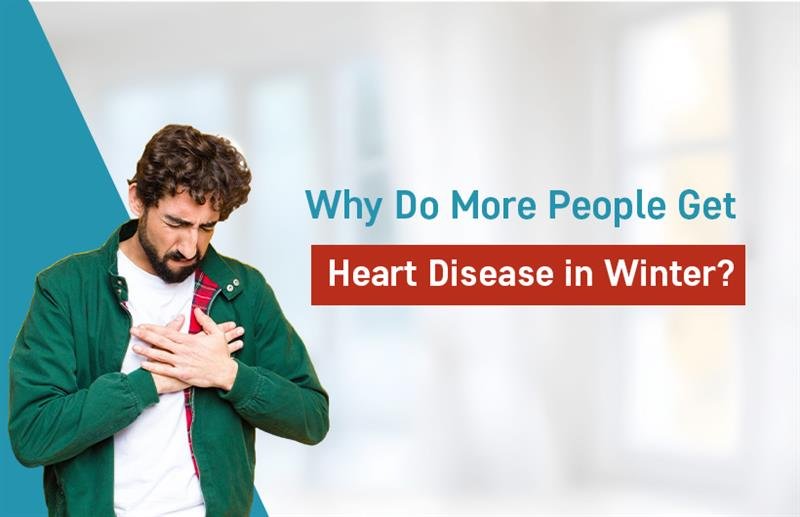As the temperature drops, the risk of heart disease rises. Winter, while cherished for its cozy atmosphere and holiday spirit, has a dark side—It is linked with many cardiovascular episodes such as heart attack, stroke, and many others. But why does this happen? But what would you do to protect yourself during this cool period?
In this blog post, we will explain why heart health is most vulnerable during winter and how you can prevent it if you suffer from seasonal depression. For consultations, there is a heart disease doctor in Ahmedabad’ or even a cardiology doctor in Ahmedabad for better suggestions.
Why Is Heart Disease More Common in Winter?
Several factors contribute to the spike in heart disease cases during the colder months:
1. Cold Weather and Blood Pressure
For instance, when the weather is very cold, your arteries will narrow so as to conserve heat. This constriction raises blood pressure with a mission to increase the pressure on the heart to pump blood. The added pressure can cause heart attacks and is most dangerous for those with pre-existing conditions.
2. Seasonal Depression and Stress
Since winter has few hours of daylight and many hours of darkness, it is associated with the seasonal type of depression known as SAD. They know that stress hormones like cortisol ratchet up the blood pressure and promote inflammation, which is bad for the heart, and that depression to heart disease is tied to cardiovascular disease.
3. Lack of Enough Sleep and Over Activity
Shoveling snow, preparing for the holidays, or even taking a walk may put an injured pressure on the heart. He points out that any vigorous activity sometimes can cause heart attacks maybe due to lack of prior exercises.
4. Weakened Immunity
Flu season happens during the winter time and this puts pressure on the heart in people who have other diseases. Heart disease complications are also reported to be closely associated with respiratory infections.
5. Dietary Indulgence
Sweets, fatty foods, desserts, and alcohol – some of what all Holiday Food consists of in addition to being calorie-rich, also raise cholesterol levels in the body which in turn leads to clogged arteries.
Symptoms of Winter-Related Heart Disease
This is why people need to educate themselves about the symptoms. Seek immediate help if you experience:
- Chest pain or discomfort
- Shortness of breath
- Fatigue or dizziness
- Oedema of the legs or feet
- Unexplained anxiety
If you notice these symptoms, consult a heart specialist near me or visit a cardiologist’s hospital in Ahmedabad without delay.
Depression’s Role in Heart Disease
Winter blues aren’t just a mood—they’re a serious health risk. Depression can directly impact heart health in several ways:
- Increased Inflammation: High stress and depression to heart disease result in inflammation of blood vessels and this causes plaque formation.
- Poor Lifestyle Choices: These include a sedentary lifestyle, poor diet, and smoking, which are standard factors of heart disease, all of which stem from depression.
- Sleep Disturbances: Either not being able to sleep at all or sleeping too much due to clinical depression alters the heart rate and the well-being of the cardiovascular system.
It is very important to pay as much attention to how your mind is doing, in winter as you do for your body.
Tips to Protect Your Heart This Winter
1. Stay Active Indoors
Cold weather isn’t an excuse to skip exercise. Activities like yoga, stretching, or walking on a treadmill can keep your heart healthy.
2. Bundle Up
The last weather tip is about dressing in many thin layers of clothes in order to keep warm throughout the day. Use a hat, gloves, socks, muffler, etc to minimize heat loss through the extremities of the hand, feet, and head.
3. Eat Heart-Healthy Foods
Eat more meals that are rich in fruits, vegetables, whole grains, and lean protein meats. Avoid consumption of foods with fats, sugar, and salt to lower cholesterol levels and blood pressure respectively.
4. Monitor Your Health
Check your blood pressure, and cholesterol levels, and be careful with the extra pounds. Ideally, it is equally important to have a health checkup with a cardiology doctor located in Ahmedabad.
5. Manage Stress and Depression
The best exercise that one might follow to achieve work-life balance is practicing mindfulness or meditation or doing something fun. In case, the chances of developing depression heart disease, and anxiety should be discussed with a therapist.
6. Stay Hydrated
This in form shows dehydration challenges the heart even in the winter season. Sugar substitutes should be restricted as well as foods high in carbohydrates and fats while drinking a lot of water, avoiding too much caffeine and alcohol.
When to Visit a Cardiologist
If you have heart disease in your family history or something like that feels wrong, do not wait until it becomes worse. They should see a heart disease doctor in Ahmedabad or find a heart specialist close to them. They can give you the diagnosis that will help save your heart and keep it in good condition.
Conclusion:
Although winter may show some elegance, it is a problem for your heart’s health. This way, you get to enjoy the season as you avoid any harm to your heart – it’s a preventive measure to take. Oh and again remember that your heart is very valuable, so do not be shy, if you feel that you require some assistance—go for it.
If you’re in Ahmedabad and you are looking for a reliable cardiologist, visit Dr. Jignesh Patel at the number one cardiologist hospital in Ahmedabad. By doing so, he assures that you can go through the winter period healthy and in your best form. Book an appointment today and let Dr. Jignesh Patel help you protect your heart this winter!






